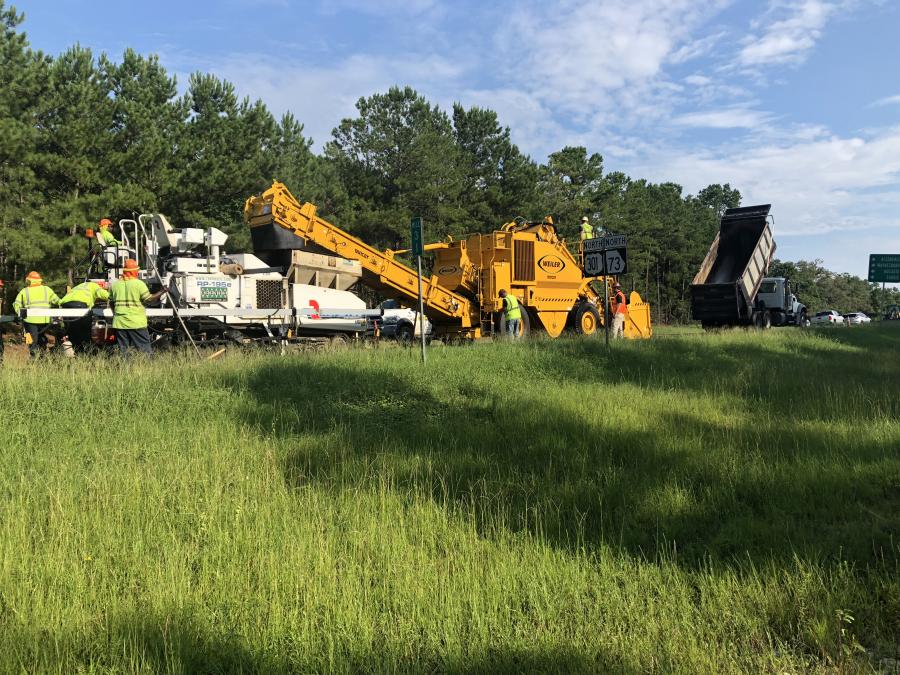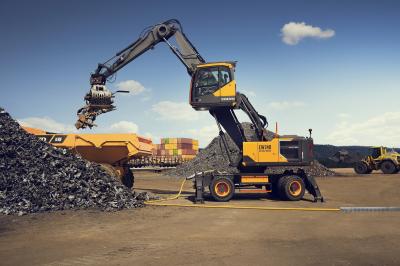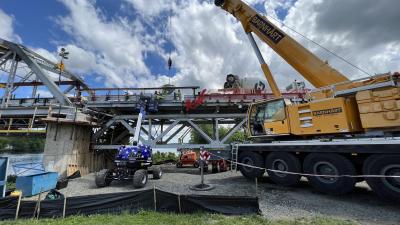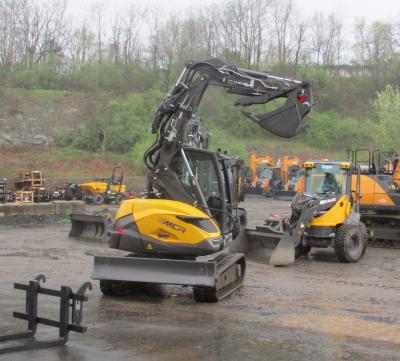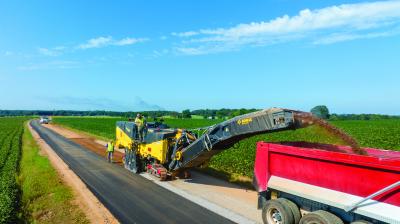Work along Route 301 in Screven County, Ga.
It's business as usual in the paving industry — almost. Construction and infrastructure work, which includes paving, have been classified as essential services. Only two states, Pennsylvania and Washington, have put this work on hold. In other states, work goes on while emphasizing federal, state and local guidelines including social distancing, sterilizing work surfaces and keeping meetings to 10 people or less. As with many industries, meetings formerly conducted in person are often handled through virtual means.
So far, there have been no reports of labor or supply shortages from paving companies.
Audrey Copeland, Ph. D., National Asphalt Pavement Association (NAPA) president and CEO, outlined progress and caution in the industry.
"According to federal guidance, asphalt pavement industry workers and supporting industries are essential to critical infrastructure viability in the areas of construction, highways and public works," Copeland said. "Our industry continues to work while implementing vital health and safety protocols. In addition, some states are allowing work that was scheduled for nighttime to proceed during the day and are accelerating projects since traffic volumes are low."
Tim Smith of Maryland DOT, State Highway Administration, explained that his organization's stance on paving is similar to the approach many DOTs are taking. State officials want people working and helping to take care of crucial needs in their respective states.
"State and federal guidelines deem transportation an essential and critical function," Smith stated. "As it relates to MDOT SHA, that includes state and consultant personnel who are supporting or delivering transportation functions. This includes, but is not limited to, construction, maintenance, dispatch, vehicle recovery, inspections, planning and design. We will continue to perform these critical functions while protecting the health and well-being of our MDOT SHA team. We have also continued to advertise contracts and open bids, continued processing invoices and monthly pay estimates. MDOT SHA remains open for business."
Amy Miller leads the Asphalt Pavement Alliance and works closely with State Asphalt Pavement Associations on national issues. The paving industry's response to COVID-19 has been one of those issues. Her team has worked on a state-by-state level to see that paving projects have been given the go-ahead while being classified as protected and essential.
"The State Asphalt Pavement Associations have worked closely with the DOTs and state officials to ensure that paving is recognized as protected and essential," Miller said. "So far Pennsylvania and Washington are the only states that have stopped work. Pennsylvania is scheduled to reopen on April 2."
She has learned of opportunities in several states where paving companies have hired people who were out of work because of the COVID-19 crisis: "In northern Florida where I live, a company was active on social media, reaching out to people who were out of work. Their personnel used expedited hiring processes and this week those people are working." Copeland added that in Virginia the commissioner of the Virginia Department of Transportation reached out to the asphalt paving industry, along with the Governor of Virginia, to encourage the industry to hire laid off workers to fill the workforce needs.
Miller has seen encouraging instances of the states working with paving contractors. "A vast number of state DOTs are becoming generous in working hours," she stated. "They are doing expedited permitting. It's all about keeping people working."
Necessary precautions have caused some changes in normal work habits. Many companies are limiting how many people ride together in a vehicle. They are also emphasizing clean up to halt the spread of any germs. They continue to provide educational information as well. Safety has gone beyond hard hats and tool-box talks. They want their workers to feel safe when they go to work.
"These are certainly trying times for our industry and trying times for our resolve," said NAPA Chairman Jay Winford Jr., president of Prairie Contractors in Opelousas, La. "As an industry, we have assisted each other and our co-workers during hurricanes, earthquakes, tornadoes, wildfires, 9/11 and the financial crisis. We will survive this situation and be stronger for it."
State-by-State Breakdown
Alabama DOT determined construction projects to be essential functions and will continue to staff them as best they can.
Arkansas construction and infrastructure jobs are continuing.
California through Gov. Gavin Newsom's Executive Order N-33-20, Californians working in 16 critical infrastructure sectors may continue working because of the importance of these sectors to California's health and wellbeing.
Colorado. The state is considering changing some projects planned for night work into day jobs because of reduced traffic volumes.
Connecticut Commissioner Joe Guilietti: "I want to assure you that the Connecticut DOT remains open for business. We believe that now more than ever, investing in our infrastructure will help our economy recover."
Dakotas. South Dakota is moving forward in construction projects while monitoring workers to practice social distancing.
Delaware DOT will continue to do business as usual while partnering with the contracting community to develop solutions and remain productive.
Florida DOT has allowed its eight districts to increase working hours to take advantage of lower traffic levels and has reduced permitting times for additional lanes.
Georgia DOT is still supporting roadway work.
Hawaii DOT intends to make full use of the lighter than normal traffic volumes to expedite projects by extending road closure times when possible.
Illinois highway construction projects are considered part of essential infrastructure.
Indiana DOT is considered an essential function and will progress forward with the construction season as planned.
Kansas road projects will continue.
Kentucky lettings and construction projects will continue and the engineers, inspectors, etc. will be deemed essential personnel.
Louisiana transportation construction is still considered an essential service.
Maine roadwork continuing.
Maryland DOT deems construction work essential.
Massachusetts DOT Administrator Gulliver endorses infrastructure work as essential.
Michigan governor ordered shelter in place but still no change to construction work allowances on the road.
Minnesota paving projects are on schedule.
Mississippi DOT sent a letter endorsing business as usual but with special provisions allowable should contractors need assistance caused by COVID-19-related business interruptions.
Missouri DOT plans to continue with projects and lettings as scheduled.
New Jersey asphalt production, quarrying operations and construction activities including NJDOT projects will be allowed to proceed.
New Mexico DOT is continuing field operations (construction and maintenance), bid lettings and payments as scheduled for the immediate future.
New York road construction is still considered essential and work continues.
North Carolina DOT has no plans to stop construction projects.
Ohio DOT Transportation work is considered critical. Contractors and suppliers expected to follow the social distancing guidelines.
Oklahoma. Both the governor and mayor of Oklahoma City have confirmed that the paving industry is essential; contractors should be careful and keep on building.
Oregon governor issued a social distancing order that directed certain businesses to close. Manufacturing and construction are not included in the order.
Pennsylvania legislators in the state petitioned Gov. Wolf to reclassify construction as essential.
South Carolina DOT considers construction to be mission-critical.
Tennessee. Individuals may leave their residences to provide any services necessary to the operations, maintenance and manufacturing of essential infrastructure.
Texas. TxDOT allowed extended work times and areas to accelerate projects. Districts are being allowed to approve contractor requests for work period and work area extensions to take advantage of the low traffic volumes.
Utah DOT has not announced plans to shut down projects in the state.
Virginia DOT's commissioner and senior leaders indicated they want contractors to keep paving and keep people employed.
Washington. On March 26, Gov. Inslee directed WSDOT to shut down all state highway construction jobs.
West Virginia Gov. Jim Justice's stay at home order exempts essential infrastructure, including construction, and will not impact ongoing construction projects.
Wisconsin. Road construction has been declared as an essential service in the state.
(*Information courtesy of the National Asphalt Pavement Association (NAPA) and State Asphalt Pavement Associations (SAPA)).
Today's top stories



